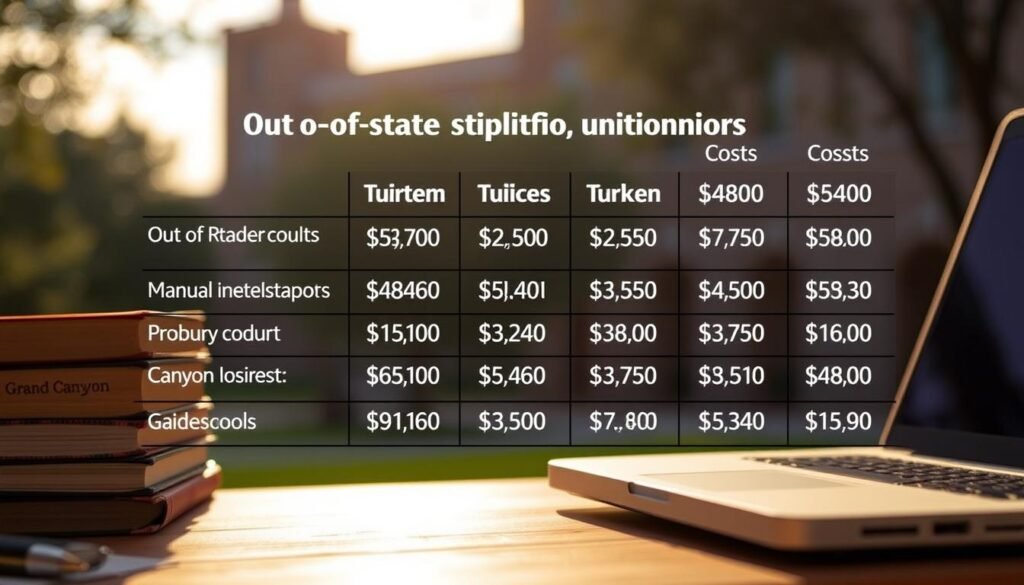Grand Canyon University tuition is a big deal for students from other states. It’s key to know the costs before deciding to go. The tuition for out-of-state students can change, so it’s important to understand all the costs.

Out-of-state tuition at Grand Canyon University includes many expenses. This includes tuition, fees, and living costs. Even though it might be more than for in-state students, there are ways to get help. Knowing the costs and aid options can help you decide if Grand Canyon University is right for you.
Key Takeaways
- Out-of-state tuition costs at Grand Canyon University can be higher than in-state tuition
- Grand Canyon University offers various financial aid options for non-resident students
- Understanding out-of-state tuition costs and expenses is crucial in making an informed decision
- Grand Canyon University tuition includes various expenses, including tuition, fees, and room and board
- Out-of-state students can benefit from breaking down the costs to determine the best course of action
- Grand Canyon University provides resources to help non-resident students manage their out-of-state tuition costs
Understanding Grand Canyon University Cost Out of State
Going to Grand Canyon University as an out-of-state student is a big deal. You’ll face non-resident tuition fees and other college expenses. Knowing the tuition structure and residency rules is key to making smart choices.
When you attend Grand Canyon University, you’ll pay for tuition, room, and board. Non-residents also face extra fees. Knowing about residency rules helps you budget your college expenses better.
Basic Tuition Structure
The tuition at Grand Canyon University breaks down into several parts:
- Tuition fees: These change based on your program and where you’re from.
- Room and board: This covers living on campus and meals.
- Additional fees: You’ll also pay for books, supplies, and getting around.
Residency Requirements
To get in-state tuition, you need to meet certain requirements. These include:
- Living in Arizona for at least 12 months before classes start.
- Showing proof of residency, like a driver’s license or utility bills.
Additional Fees for Non-Residents
Non-residents pay more, including:
- Out-of-state tuition fees: These are higher than for in-state students.
- Extra course fees: Some classes cost more for non-residents.
Understanding the tuition and residency rules helps you plan your college expenses. This way, you can make the best choice for attending Grand Canyon University as an out-of-state student.
Breaking Down the Annual Cost of Attendance
As an out-of-state student, knowing the annual cost at Grand Canyon University is key. The total cost includes college expenses like tuition, room, and board. It also covers books, supplies, and transportation. Breaking down these costs helps you understand what to expect.
The annual cost has several parts. Here are the main ones:
- Tuition fees: This is the main part of the cost and includes out-of-state tuition costs
- Room and board: This covers on-campus housing and meal plans
- Books and supplies: This includes textbooks, materials, and other essentials
- Transportation: This is the cost of getting to and from campus
Knowing these parts helps you plan your finances better. It’s also good to think about other college expenses like personal costs and health insurance.
Grand Canyon University’s website has a detailed breakdown of costs. This helps you estimate your expenses. By looking at this info and thinking about your own situation, you can make a plan. This plan will help you manage your out-of-state tuition costs and other college expenses.
Room and Board Expenses for Out-of-State Students
As an out-of-state student at Grand Canyon University, you need to think about room and board costs. The university has many on-campus housing choices. These range from traditional dorms to apartment-style living. It’s important to pick the right one for your budget and needs.
When looking at on-campus housing, think about what you need. Consider the type of accommodation, meal plans, and amenities. For example, some places offer meal plans. This can make things easier and give you a convenient place to eat. Also, think about how close the housing is to campus facilities like classrooms and libraries.
Here are some key points to consider when evaluating room and board expenses:
- On-campus housing options: traditional dormitories, apartment-style living, and suite-style accommodations
- Meal plan choices: varying plans to suit different dietary needs and preferences
- Off-campus living costs: factors to consider when exploring off-campus housing options, such as rent, utilities, and food expenses
By carefully looking at these factors, you can make a good choice about room and board. This will help you have a great academic experience at Grand Canyon University.
Additional Fees and Hidden Costs
As an out-of-state student at Grand Canyon University, you need to think about extra fees and hidden costs. These can add up fast, so it’s key to include them in your budget. Additional fees for things like parking, health insurance, and other services can cost from a few hundred to several thousand dollars a year.
There are also hidden costs like lab fees, equipment costs, and other small expenses. Here are some estimated costs you might face:
- Parking fees: $500 – $1,000 per year
- Health insurance: $1,000 – $3,000 per year
- Lab fees: $200 – $500 per course
- Equipment costs: $500 – $1,000 per year
It’s important to check the university’s website and talk to the financial aid office. This way, you’ll understand all the extra fees and hidden costs. Knowing this helps you avoid surprises and make smart choices about your education costs.
Financial Aid Options for Non-Resident Students
If you’re an out-of-state student at Grand Canyon University, you might qualify for financial aid options. These can greatly reduce the cost of your education. Grand Canyon University has many scholarships and grants for non-resident students to reach their academic dreams.
Here are some financial aid options for non-resident students:
- Federal Pell Grants: These grants go to undergraduate students who show they need financial help.
- Direct Subsidized and Unsubsidized Loans: These loans are for both undergrad and graduate students. They help pay for tuition, fees, and living costs.
- Institutional Scholarships: Grand Canyon University has many scholarships for non-resident students. These can be based on merit or need.
Non-resident students might also get state-specific aid. It’s important to look into these options to see what you qualify for. Using these financial aid options can make college more affordable. This way, you can reach your academic goals.
Comparing GCU’s Out-of-State Costs to Other Universities
Thinking about Grand Canyon University as an out-of-state student? It’s key to look at costs compared to other schools. Tuition for out-of-state students varies a lot. Knowing these differences helps you choose wisely.
College costs, like tuition, room, and board, can quickly add up. So, finding a school that matches your budget is crucial.
Some schools with similar costs to GCU include:
- Arizona State University: $28,336 per year
- University of Arizona: $30,025 per year
- University of Nevada, Las Vegas: $20,600 per year
Remember, these prices can change. Always check the latest tuition rates for each school. This way, you can see which school gives you the most bang for your buck.

Don’t just look at tuition. Also, think about room and board, fees, and books. By comparing all these costs, you can pick the right school for you. Out-of-state tuition can be high, but with the right research, you can find a great match.
Tips for Managing Out-of-State Expenses
As an out-of-state student at Grand Canyon University, managing your expenses is key. Using budget planning strategies can help. This way, you can lessen your financial load and get the most from your education. It’s important to find ways to cut back on spending and use that money for what really matters.
Looking for cost-saving opportunities is a good start. You could share an apartment, cook your meals, or use student discounts. Making a few smart changes can greatly lower your costs and make your education more affordable.
- Create a budget and track your expenses to stay on top of your finances
- Look for scholarships and grants that can help offset the cost of tuition
- Consider taking out a student loan to help cover expenses
By following these tips and being proactive with your finances, you can make the most of your education. This will set you up for success in the long run.
Student Success Stories and Experiences
Grand Canyon University is known for supporting its students, including those from other states. By sharing student success stories, we learn what it’s like to be an out-of-state student at GCU. Many students feel welcomed and supported, helping them succeed in their studies.
Out-of-state students have had great out-of-state student experiences at GCU. They love the university’s facilities and faculty. For example, they enjoy the sports facilities and the variety of extracurricular activities.
Some key benefits of studying at GCU as an out-of-state student include:
- Access to excellent facilities and resources
- A supportive and welcoming community
- Opportunities to engage in extracurricular activities and sports

Current students and alumni share their experiences, giving us a unique view of GCU. Many feel at home, even though they’re far from family. This is thanks to GCU’s strong community spirit, built through various activities and events.
The student success stories and out-of-state student experiences at GCU show the university’s dedication to its students. GCU creates a supportive environment where students can thrive and reach their goals.
Conclusion: Making Your GCU Investment Worth It
Thinking about going to Grand Canyon University as an out-of-state student? It’s key to see the value in your choice. The out-of-state tuition costs might be more, but the university’s good name, solid programs, and support for students could make it worth it.
Getting a handle on the costs, looking into financial aid options, and finding ways to save can help. This way, your time at GCU can be both possible and fulfilling. Plus, the university’s focus on student success and the variety of views from out-of-state students can make your college years richer.
In the end, choosing GCU from outside Arizona is a personal call. But with the right info and a smart financial plan, you can get the most out of your Grand Canyon University investment. This will set you up for a bright future ahead.
FAQ
What is the out-of-state tuition at Grand Canyon University?
The out-of-state tuition at Grand Canyon University for the 2023-2024 year is $17,050 per semester. This totals $34,100 for the whole year.
What are the residency requirements to qualify for in-state tuition at GCU?
To get in-state tuition at Grand Canyon University, students need to meet certain rules. They must live in Arizona for 12 months before the semester starts. They also need to show they can financially support themselves.
What additional fees do non-resident students have to pay at GCU?
Non-resident students at Grand Canyon University pay more than just out-of-state tuition. They also have to pay a general student fee, a technology fee, and other mandatory charges.
What financial aid options are available for out-of-state students at GCU?
Out-of-state students at Grand Canyon University can get financial aid. This includes scholarships, grants, federal aid, and state-specific aid. It’s key to look into all these options to lower the cost of tuition.
How does the cost of attending GCU as an out-of-state student compare to other universities?
When comparing Grand Canyon University’s out-of-state tuition to other schools, consider several things. Look at program quality, campus life, and the value you get. GCU’s tuition might be competitive with other private or online schools.
What are some tips for managing out-of-state expenses at GCU?
To handle out-of-state expenses at Grand Canyon University, students can try a few things. They can make a detailed budget, look for ways to save money (like living on campus or using meal plans), and use financial aid resources.